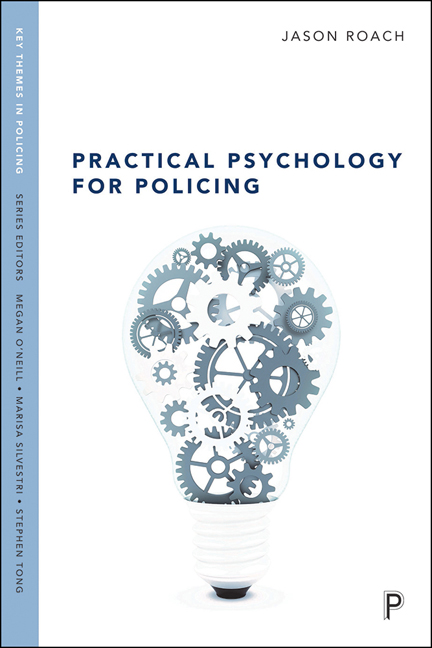Book contents
- Frontmatter
- Dedication
- Contents
- Series preface
- List of figures, tables, and boxes
- Acknowledgements
- 1 Introduction (or unleashing the kraken)
- 2 Psychology and policing: welcome bedfellows?
- 3 Human and police decision-making
- 4 Challenging common police perceptions of career criminals and serious offenders
- 5 Self-Selection Policing
- 6 Psychology, expertise, and improving police officer street-craft
- 7 Psychology and crime prevention
- 8 Psychology and police wellbeing
- 9 Psychology and policing: taking stock and where do we go from here?
- Notes
- References
- Index
9 - Psychology and policing: taking stock and where do we go from here?
Published online by Cambridge University Press: 17 January 2024
- Frontmatter
- Dedication
- Contents
- Series preface
- List of figures, tables, and boxes
- Acknowledgements
- 1 Introduction (or unleashing the kraken)
- 2 Psychology and policing: welcome bedfellows?
- 3 Human and police decision-making
- 4 Challenging common police perceptions of career criminals and serious offenders
- 5 Self-Selection Policing
- 6 Psychology, expertise, and improving police officer street-craft
- 7 Psychology and crime prevention
- 8 Psychology and police wellbeing
- 9 Psychology and policing: taking stock and where do we go from here?
- Notes
- References
- Index
Summary
Introduction
If, like me, you have never seen the point of the last chapter of a book merely summarising (that is, basically repeating) the chapters that have gone before, then rest assured that it is not happening here. This chapter is therefore short, to encourage the reader to get the impression that this book is more of a beginning than an end, more of a work in progress than fait accompli. If achieved, then it is hoped it will ether provoke or stimulate further thought as to where the relationship between psychological research and knowledge and policing might need to focus and develop in the future.
Hopefully, having now convinced the reader of the valuable contribution that psychology has and can make in the future – for example, regarding advancements in the interviewing of suspects and witnesses, the enhancing of investigative decision-making, and with the prevention of crime – how the relationship between both might be advanced is the obvious next question. I am not so conceited as to think that I alone possess a metaphorical roadmap for how any relationship needs to go, I merely intend to make some suggestions for likely areas where it might wish to stop off on the journey.
‘The dating game’: in search of the ideal relationship between police and academic researchers
The only advice that I ever give when anybody asks me about their ‘relationships’ or for that matter any ‘affairs of the heart’ is, first, not to ask for any such advice in the first place, and second, not to offer any advice about such matters under any circumstances. Unless that is you are particularly adept at negotiating your way through ‘emotional minefields’. In my experience at least, that way disaster lies, particularly in the shape of an angry friend with whom you agreed that indeed their relationship was over, but which turns out several months later, not to be the case.
Any advice given here is solely meant to foster and forge productive relationships between police and academics, so that the chances of me being held responsible for any emotional car crash that might ensue are minimal enough to make it a rare exception.
- Type
- Chapter
- Information
- Practical Psychology for Policing , pp. 108 - 113Publisher: Bristol University PressPrint publication year: 2023



